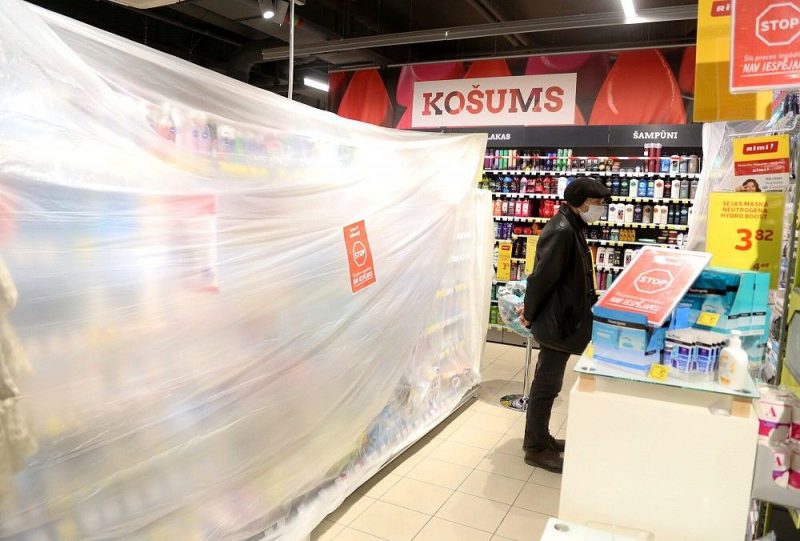–
–
–
–
6:36, September 22, 2021
–
Could a situation arise that shopping centers go bankrupt in the near future?
“If we introduce restrictions that allow access to the shopping center only with a covid certificate, it is exactly the same if the shopping center is simply closed, given our current vaccination coverage,” TV24 shows “Personality of the Day with Velta Puriņa” Mārtiņš Vanags, Chairman of the Board of the Real Estate Developers Alliance.
–
Cocktail
VIDEO. A video has been streamed on the Internet, in which several well-known people in Latvia can be seen sniffing white powder
17 hours
–
The news
In Jurkalne a car with a dead man found on the sea shore
12 hours
–
Cocktail
Tavi resources today will be quite limited! Horoscopes for September 22
12 hours
–
Even in a situation where stores in shopping malls are divided, namely, in convenience stores and conditionally in convenience stores, the retail industry and tenants will be subject to a drastic regime.
He points out, by way of example, that it might look something like this – anyone can go to the grocery store, but only to the clothing store with a certificate. Unfortunately, for the traders themselves, this would not greatly improve the situation.
“Of course, it’s a little better than deciding that trade restrictions are for everyone, not just the unvaccinated,” Vanags said.
It has already been reported that Latvia’s largest shopping centers call on the government not to follow the example of Lithuania, where people without a Covid-19 certificate are not allowed to visit supermarkets, representatives of the Real Estate Developers Alliance (NĪAA) told LETA.
The NAA has appealed to the government “not to repeat Lithuania’s mistakes in the division of buyers, which have caused widespread public dissatisfaction, interruptions in the availability of products in the neighboring country and a serious threat to business continuity”.
In the opinion of shopping centers, food, medicine and other basic necessities must be available in all shops, including shopping centers, to all citizens equally and without division.
In turn, in order to ensure the possibility to operate other stores, the assortment of which is not included in the list of first necessities, it is possible to consider the possibility to allow people who present a valid certificate or have been tested at the entrance to the particular store.
Representatives of the NAA emphasized that the Covid-19 shopping centers acted as socially responsible companies during the pandemic, investing significant resources in the preparation and placement of information materials, as well as opening 17 vaccination points throughout Latvia, to which each shopping center allocated an average of 150 square meters without rent. These vaccination points have become an important part of the vaccination process, so it is important to ensure continuous access to them without closing shopping centers to a large part of the public.
“Lithuania’s experiment of denying unvaccinated people access to convenience stores has failed and there are discussions in the neighboring country about changing this model. Latvia should not repeat Lithuania’s mistakes, but introduce an epidemiologically and economically sound model that allows anyone to access basic necessities stores – food, pharmacies and others, and vaccination points in shopping centers. It is possible to discuss what are the conditions of access – test, certificate or others – to secondary stores, such as clothing stores, ”said Mārtiņš Vanags, Chairman of the Board of NĪAA.
In order to ensure a level playing field in the industry, shopping centers call for a level playing field for all outlets that are able to provide an epidemiologically safe indoor environment through adequate mechanical ventilation.
The NAA emphasizes that air quality is one of the most important factors influencing the spread of the virus indoors, as confirmed by the World Health Organization, researchers at the Massachusetts Institute of Technology and researchers from the United Kingdom (Environmental and Modeling group).
All major shopping centers in Latvia are equipped with powerful air ventilation systems, which ensure complete exchange of all air even within 20 minutes. So up to three times an hour, all the air in the mall changes, ensuring that with each flow of customers, most potential virus particles are removed from the building. As a result, very low CO2 levels are maintained in commercial premises through ventilation – an average of 395 to 660 parts per million (ppm).
Meanwhile, Liene Dupate-Ugule, communications manager of retailer SIA Maxima Latvija, told LETA that the introduction of restrictions such as those in Lithuania would create a significant number of unvaccinated people gathering in smaller format stores, as well as shortage of goods. necessities for a large part of society.
‘Such regulation can be particularly severe for the most vulnerable sections of society, including seniors with reduced mobility. Restricting access to food and medicine in larger stores can put seniors at even greater risk – with colder weather and queuing outside the store with a large number of unvaccinated people, there are additional health risks for vaccinated seniors, further straining the health system, ”said Dupate. Ugule.
In the opinion of Maxima Latvija, at least the basic necessities – food and medicines – as well as services must be available to all residents of Latvia, regardless of the size of the store.
Dupate-Ugule emphasized that in Latvia such restrictions would particularly severely affect regional shopping centers and small businesses outside Riga, which are located in these sales locations.
NĪAA unites the most important participants of the industry in order to achieve sustainable growth of the real estate industry, to represent it together at the state and local government level, as well as to actualize the role of real estate developers and investors in the Latvian economy.
On September 13, new restrictions came into force in Lithuania for people who do not have a so-called opportunity passport, a document certifying that a person has been vaccinated against Covid-19, has contracted the disease or received a negative test result in the last 48 hours.
Without an “opportunity passport”, it is allowed to shop only in small shops of daily necessities with a separate entrance from the outside, if their sales area does not exceed 1,500 square meters.
Themes
–


